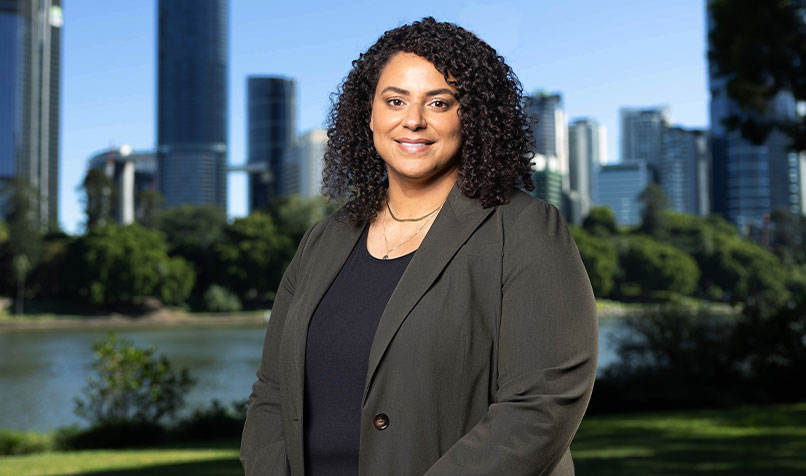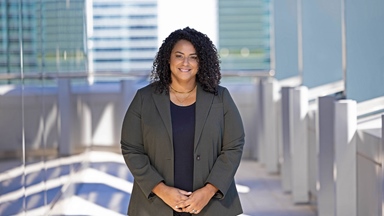Loading component...
At a glance
- For Tracy Thelander CPA, a professional career as an athlete gave way to a passion to give back to her community and improve financial literacy.
- Being able to provide operational support to deliver impact for First Nations communities is a motivating force for Thelander.
- NAIDOC Week: The Next Generation, Strength, Vision & Legacy is a positive message that builds on the change that has already come.
Growing up, Tracy Thelander had two goals. The first was to become a full-time competitive swimmer and the second was working out how to use her maths skills to help her community thrive.
“I really wanted to be a full-time athlete and my parents supported that, but they also sat me down and encouraged me to have a back-up plan in case it didn’t work out,” she says.
It was good advice, she reflects. While swimming remains a passion, she is now more focused on improving outcomes for Indigenous communities.
Thelander is a proud descendant of the Neli Nidgiri (Brown/Close) family line and recognised apical ancestors of the Quandamooka People from Minjerribah, North Stradbroke Island.
As senior finance and operations manager at yamagigu Consulting, Australia’s largest Indigenous-owned and operated consultancy, she also provides support to help the firm’s client-facing work. This often involves travelling to remote communities to understand issues like food security and child welfare.
“I was really good at maths and I’ve always wanted to provide some form of support, whether it’s financial literacy training or volunteering my skill set with the businesses on the island where I’m from. So the back-up plan was studying accounting,” she says.
It was the first step in a career that has seen her work as an investigator with the Australian Competition and Consumer Commission and then as an assistant accountant with the Queensland Aboriginal and Islander Health Council.
The latter is the state’s peak body, whose primary purpose is to represent and support the Aboriginal and Torres Strait Islander Community Controlled Health Services in Queensland.
That role gave her invaluable insights into how Aboriginal Community Controlled Health Organisations (ACCHOs) operate and continues to inform her current role, she says.
“I absolutely loved that job. I learned so much more about Indigenous health and the back end of ACCHOs than I ever thought I would learn. It really helped me understand the way that Aboriginal medical service at home operates.”
Thelander also works to spread the word on the benefits of a career in accounting, and also collaborates with CPA Australia on the Indigenous Advisory Group in developing the organisation’s reconciliation action plan.
“I’ve been the chair of the Indigenous Advancement Committee for almost two years now and that is really about looking at how we can increase Indigenous membership across the profession,” she says.
Expanding the pipeline of Indigenous accountants
Sharing knowledge
While Thelander lives on the mainland now, she travels regularly to North Stradbroke Island to visit her family and volunteer her services to local businesses who need help with bookkeeping and general accounting.
“It was always in my mind that whatever I learned, I brought back to the island. I really want to help with financial literacy and upskill people so they can manage their own finances moving forward,” Thelander says.
It is a similar purpose that drives her professional life. One of her biggest motivators is providing the operational support to allow her colleagues to deliver impactful results in their work.
"I’ve been the chair of the Indigenous Advancement Committee for almost two years now — and that is really about looking at how we can increase Indigenous membership across the profession."
“From a finance perspective, my role allows me to analyse the quantitative data and connect it with the narrative, helping to showcase the impact of the work we’re doing,” she says.
“Our mission is ‘profit for purpose’. We’re not a large organisation — but with around 65 to 70 staff across Australia, 60 per cent of whom are Indigenous, we accomplish a great deal.”
yamagigu means “our purpose is to go with you”, which reflects the organisation’s goal of always seeking more favourable outcomes for First Nations people across Australia, Thelander says.
“It is a majority Indigenous-owned, operated, staffed and led organisation. While 49 per cent ownership sits with Deloitte, we’re a separate legal entity, which allows us to be self-determining.”
In the field

While Thelander’s role primarily covers traditional management, accounting and finance tasks along with operations, she has also worked on client-facing projects, which have allowed her to see first-hand how the business makes an impact.
The majority of yamagigu’s work is with government departments and agencies working on policy reform, with a smaller percentage being done with corporations and some Indigenous organisations, she says.
“Over the past year, I’ve been involved in cultural safety facilitation, outsourced CFO work, and consultations related to childcare centres, child safety and education. It really depends on the business’s needs at any given time. If there’s a need for a senior Indigenous female on a project, I step in and provide support,” she says.
One project was working with the federal government to understand food security in remote communities across Australia.
“For communities that rely heavily on welfare, it’s important to see firsthand how far a welfare pay cheque can stretch,” she says.
“It’s easy to look at the cost of something like lamb cutlets in a city and think, ‘Wow, that’s expensive for A$25’. But in remote communities, that same tray of lamb cutlets might cost A$75.”
Visiting communities provides clarity when it comes to reporting and advocating for meaningful policy changes, she explains.
"I’ve been the chair of the Indigenous Advancement Committee for almost two years now — and that is really about looking at how we can increase Indigenous membership across the profession."
“When we are discussing policy change and service reform, it’s clear that you can’t get the full picture from the Brisbane CBD. You have to go out to the communities to truly understand, see, hear, feel and experience the disparities these communities face.
“Those conversations on the ground reveal why some people and families revert to the bare essentials — like plain flour for damper, or lollies and drinking Coke, because it’s cheaper than water.”
Child safety is another issue Thelander is focused on. Aboriginal and Torres Strait Islander children are almost 11 times more likely than non-Indigenous children to be removed from their families, and 10.5 times more likely to be in out-of-home care. It is a situation Thelander believes has to change.
“Before COVID-19, we were already seeing what could be described as the second wave of the Stolen Generation,” she says.
The Stolen Generation had profound impacts on First Nations people across Australia, including the lasting effects of intergenerational trauma, Thelander notes.
“What’s less reported, however, is the ongoing removal of First Nations children from their families and communities, with many being placed into foster or out-of-home care.
“If Indigenous children are still being taken from their homes and communities and placed into care arrangements outside of their communities, clearly something isn’t working as it should.”
How accountants can ‘show up’ for Indigenous communities
The next generation
Thelander points to this year’s theme for National Aboriginal and Islanders Day Observance (NAIDOC) Week: The Next Generation: Strength, Vision & Legacy. It is a positive message that she says builds on the change that has already come.
“I often hear that what happens now will affect the next seven generations,” she says. “If we look back at the Stolen Generations, for example, the impacts are still felt today. But if you think about how far we’ve come from generations before us — we have made some progress.
“I can only imagine that the next generation after us is going to be so much better than what we are as well, which is just going to continue this ripple effect of change.”
One piece of advice
“Never lose the love of learning and becoming a better colleague and a better leader. For me, learning is broad. It ranges from deepening my knowledge of traditional accounting to understanding how AI will shape and enhance my work, to continuing to learn my Jandai language, my family's stories and my culture.”

